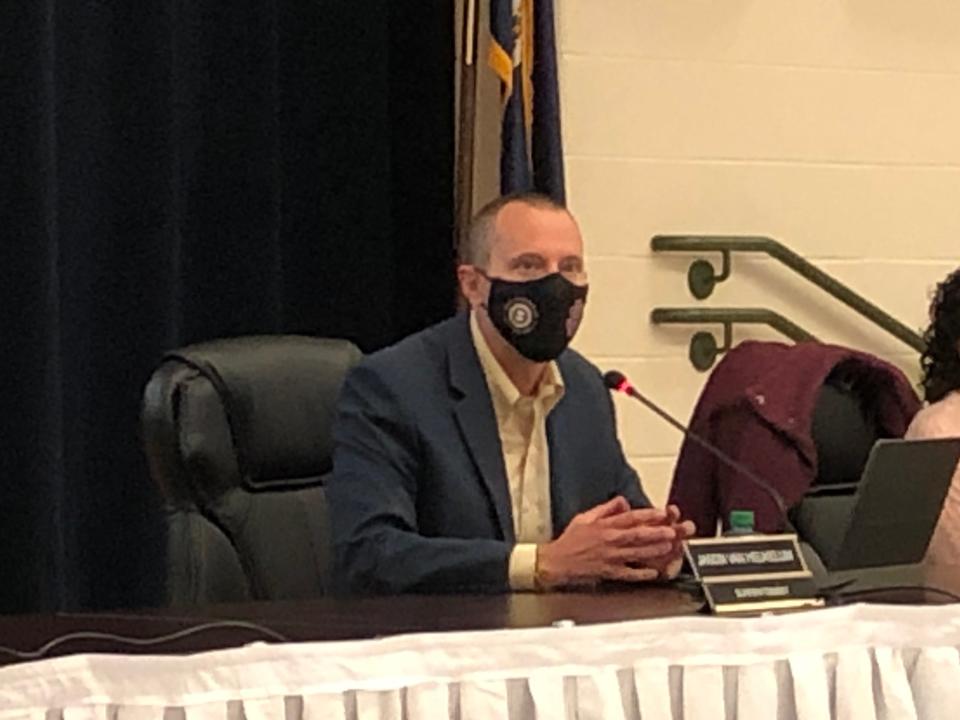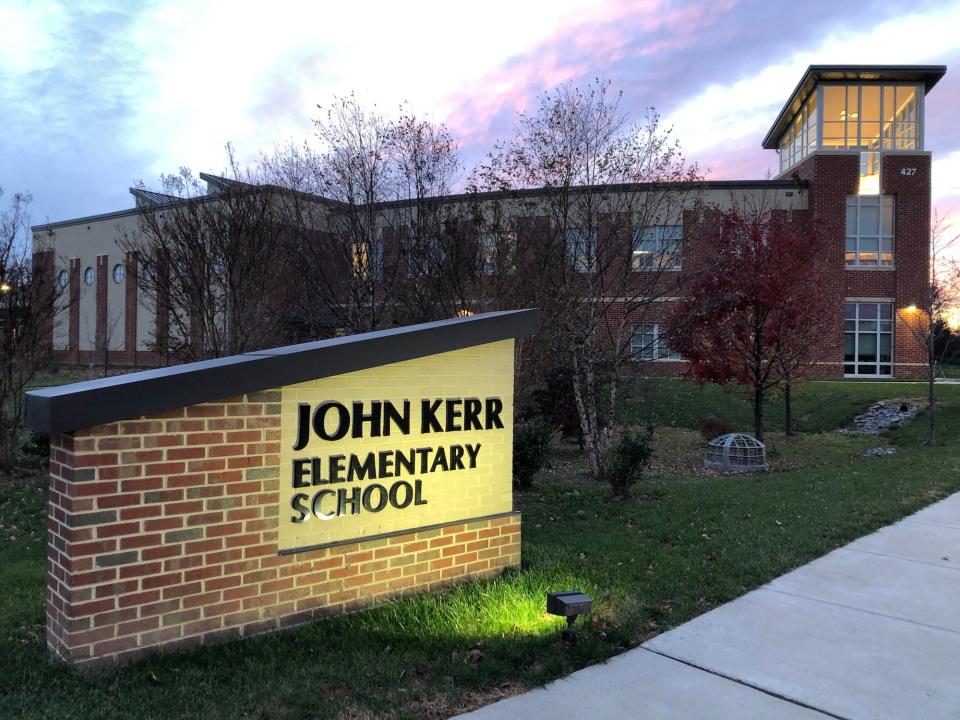I went to 'the shuttlecock of the Confederacy' to hear what people there thought about critical race theory. I heard about equity instead.

Protesters have fought school boards over masks, books, and "critical race theory."
But equity was the dominant theme at a school-board meeting in Winchester, Virginia.
And no one showed up to protest.
WINCHESTER, Virginia — School-board meetings across the US have grabbed headlines for turning into battlegrounds over face-mask policies, controversial books, and critical race theory. The internet is awash with photos of parents and children at meetings hoisting signs in protest, demanding an end to teachings on race and diversity in schools.
But none of that happened at a school-board meeting I attended Monday in Winchester, Virginia, a city rich with Civil War history in the Shenandoah Valley.
It would seem this independent city in Frederick County, about 65 miles from Washington, DC, could have the potential for flare-ups on race education. After all, the quaint historic downtown area has a statue of a Confederate soldier in the center of the restaurant and shopping area, just in front of a Civil War museum. And Winchester earned the nickname "the shuttlecock of the Confederacy" because it was the most contested town during the Civil War.
By contrast, the dominant theme at the meeting at John Kerr Elementary School was equity. No one there argued that schools were "indoctrinating" children. No citizens signed up to speak during the public-comment period. School-board members spent opening remarks thanking one another and the community and wishing everyone a Happy Thanksgiving.
The meeting was so sedate, I had time to order a couple of Christmas presents on Amazon while there.
"I don't take a ton of phone calls," said Winchester Public Schools' superintendent, Jason Van Heukelum, who agreed to sit down with me after I assured him I wasn't pursuing a gotcha agenda. "When we had to decide on the masks...well, then we got some public comment." When the state issued its more-inclusive transgender policy, Van Heukelum said, the public comments from Winchester were both for and against it.
What about critical race theory? Van Heukelum said it wasn't until the most recent election in Virginia when he heard about critical race theory, a college-level study of racial bias in US laws. Republicans have been fueling controversy over it, even though educators say it isn't taught in K-12 schools. A pledge by Virginia's Republican governor-elect, Glenn Youngkin, to "ban" critical race theory was an applause line during his campaign.
Once Van Heukelum learned what it meant, he said, he "adamantly" explained to anyone who asked that it's not part of the formal curriculum or the way the district taught students.

A far cry from the heated culture wars elsewhere
The reaction to the topic in Winchester, which is about 140 miles north of Virginia's state capital, Richmond, was a far cry from the heated culture-war protests around the US, including in nearby Loudoun County. No parents spoke about critical race theory publicly at school-board meetings, but they called and emailed a few times, Van Heukelum said.
"Some are genuinely curious, like: 'I heard this in the news. What's this all about?'" Van Heukelum added. "Others seem to have bought into this belief that there's a hidden curriculum or a hidden agenda in the public schools, which there is not, and are very either upset or angry or, you know, trying to put forward a mentality of, this should not be in our public schools."
In 2020, protesters gathered at the Confederate statue in Winchester after the murder of the Black man George Floyd by a white police officer during an arrest in Minneapolis. A petition to remove the statue gathered more than 5,000 signatures. Another petition had nearly 900 signatures to keep it. But the statue hasn't been an issue for the school system, Van Heukelum said.
"It's certainly an opportunity for our teachers to navigate the current national narrative around statues and naming, etc., as a current-events piece," Van Heukelum said.
Local history is becoming increasingly important, he said, and another example of that is the remodeling and expansion of the historic Douglas School, where Black students were educated before schools were integrated, and an oral-history project with alumni.
The vision is to make the stories and visits to the building part of the curriculum for fourth graders so they can learn about the history and accomplishments of Winchester's Black community. High schoolers enrolled in a new African American history class will serve as guides, Van Heukelum said. "We're trying to make it relevant and real to our community," he said.

Winchester was hotly contested during the Civil War and changed hands more than 70 times. These days, the city is represented in Congress by a Democrat — Rep. Jennifer Wexton — but Youngkin only narrowly lost to the Democrat Terry McAuliffe there, 50.54% to 48.69%.
The student body is diverse, and the school system appears to be responding to that diversity with an "equity policy" requiring annual reports on its progress.
In August, Rep. Andy Harris, a Maryland Republican, warned about critical-race-theory "code words" like "equity" at a school-board meeting in Dorchester, Maryland, some 180 miles away from Winchester. "I don't even know what that means," Harris said.
But in Winchester, the school board's policy says the word equity "refers to fostering a barrier-free environment" where all students can benefit from high standards, support, and effective learning environments and resources.
I visited a local Walmart and asked Taryn Roberts, a mother from Winchester, what she wanted her three children to learn about race and equity. "I want them to be understanding that there's different people, and they're going to look different than you, so you shouldn't treat them different," she said. I wanted to hear more, but we were just inside the front doors, and a store employee told me, "We can't have you doing this on Walmart property."
Fair enough.
At a nearby Target, another mother who lives in West Virginia but works in Winchester said she'd heard some people were "offended," perhaps because of outreach to Hispanic students. "When it comes to our country, they should know our language, too, and not pick and choose over our children's way of, you know, doing things and how they speak," Mary Hicks said.
The Winchester school system's Hispanic population is growing, and children are "on fire" learning both Spanish and English in the dual-language program, Van Heukelum said. He said he could count on one hand the phone calls from families who had said, "I don't like that, I'm out."
During the school-board meeting I attended, teachers gave a presentation on the benefits of the dual-language program at the middle school. The equity and family-empowerment coordinator delivered an equity report.
The data on "culturally responsive instruction" for Winchester Public Schools showed that an average of 50% of sixth-through-12th graders felt they saw representations of themselves reflected in the curriculum and instruction, but only 46% of Black students felt that way.
"We're putting that on the table transparently to say, 'Hey, we're not going to hide from this, we're not going to sweep it on the rug,'" Van Heukelum said. "'We're going to look at it, analyze it and ask critical questions to say, why might that be? What might we do differently as an organization to make sure that all of our kids feel included?'"
Read the original article on Business Insider

